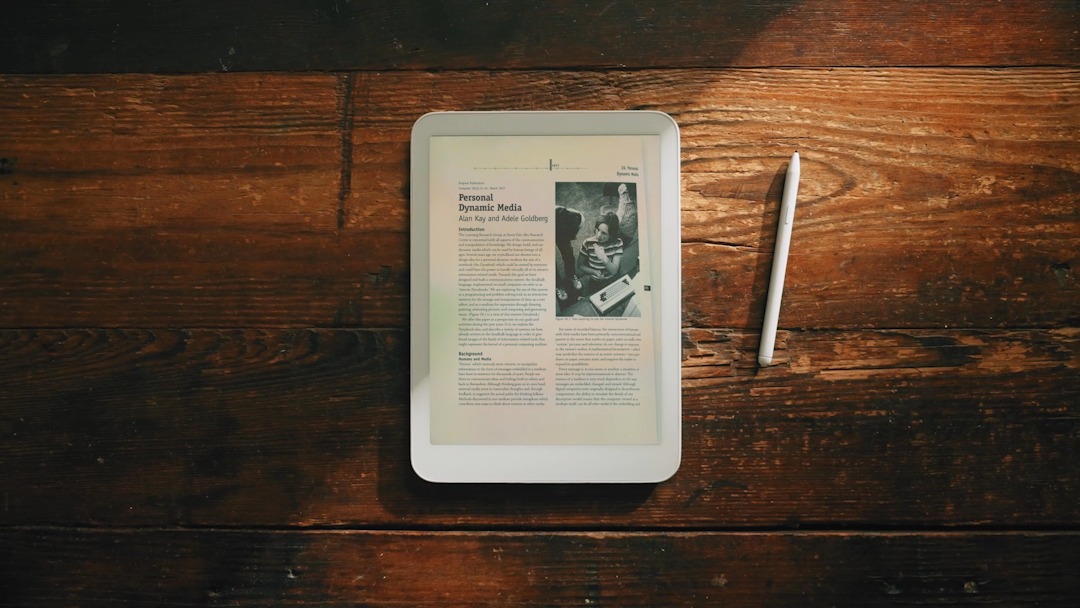
For the most part when you think about E-ink displays, what comes to mind is an Amazon Kindle or the Barnes & Noble Nook—small tablets that aim to make reading on a digital display feel more comfortable by using e-ink instead of the brighter, more common LCD and LED displays.
Now there's a new competitor on the block. A company called Daylight Computer
(as shared by 9to5Google) recently announced the Daylight DC1, a 10.5-inch Android tablet that features a screen the company calls Live Paper.
The Live Paper display is a monochrome screen that does not produce blue light, which is widely decried as being bad for your sleep and overall health. Many smartphones now offer the option to turn off blue light, and companies like Gunnar sell glasses designed to block blue light.
The Daylight DC1 is being marketed as a healthier alternative to brighter tablets that produce blue light, but it's not without its own luminescence. The tablet features a backlight for evening and night use that puts out "pure amber" light, according to Daylight, with supposedly no PWM (pulse-width modulation) flicker that is seen on other displays.
Amazon and others have made attempts at a proper e-ink tablet, but most e-ink displays tend to be slower and more prone to hitching or display errors than the best tablets. It’s partly why some us here at Tom's Guide prefer reading comics on an iPad than the Kindle.
Introducing the Daylight ComputerIt does less…So you can be more 🍃Order now: https://t.co/MWYzSM4534 pic.twitter.com/NyRy4rKEwXMay 23, 2024
According to Daylight, the DC1 runs on a custom Android OS called Sol:OS. It is meant to be minimally distracting, with notifications turned off by default. The company has touted that a goal of the Daylight tablet is to reduce our “addiction” to screens and phones. However, the tablet is designed to run normal Android apps, and comes pre-installed with apps like Audible, Kindle, Google Docs and more.
The tablet also comes with 8 GB of RAM and 128 GB of storage with an 8,000 mAh battery running on a MediaTek Helio G99 chipset. That battery, coupled with a minimal operating system, could mean this tablet might for multiple days on a single charge.
The tablet also comes with a passive Wacom stylus. You can pay $729 for a Daylight DC1 right now, but it appears the company is releasing the tablet in batches. The first three are already sold out and as of this writing, wave 4 won’t ship until November 2024.
Daylight was founded by Standford graduate Anjan Katta, and from what we gather he’s been working on this device for over six years. His goal with the Daylight computer is to make a “healthier” computer, and in in various interviews Katta said that he wants his device to combat eyestrain and distraction while redefining our relationship with gadgets.
Over the years he has said in interviews that whatever device Daylight makes will be designed for “writers, thinkers and knowledge workers.” Many of the podcasts we found him talking on are crypto-adjacent or specifically about talking to "eclectic" thinkers.
Based on various podcast interviews we could find of Katta, the DC1 isn’t the end goal of the company. Katta wants to see the Live Paper display in all kinds of devices like monitors, laptops and watches.
Is the Daylight DC1 a technology flash in the pan or will we see a wave of Live Paper devices in the future? It’ll be interesting to see how this devices truly works once its in people’s hands.





